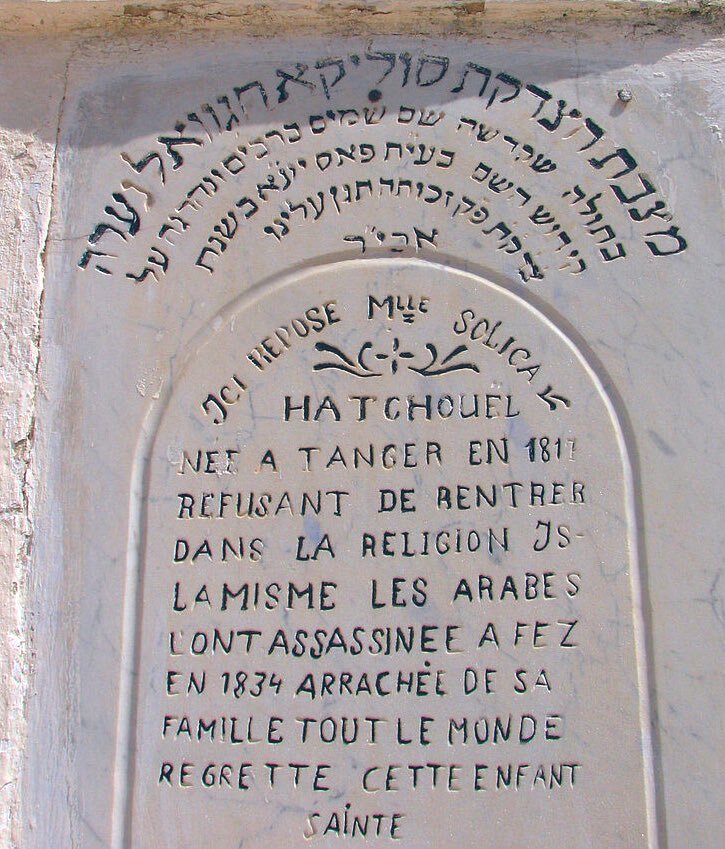When French painter Alfred Dehodencq painted many versions of his famous “Execution of a Jewess in Morocco” in 1861, he was almost certainly thinking about the tragic conclusion to a series of events that had happened decades earlier — a scene to which he bore witness.
The painting itself is an extraordinary piece of art. It finds a way to convey the grisliness and the crowd’s sheer thirst for blood without glamorizing their deeds or trampling over the memory of their victim. The ambience is irresistible, evoking a rich 19th-century setting. Beyond the execution block, the onlookers are divided into two sides by an invisible line. The Moors stand on one side, jeering at their victim, calling for the death of someone they consider an infidel.
On the other side are the Jews, looking on in absolute horror — begging and praying to put a stop to this violence. Away from the mob stands a rabbi in his black garb holding his clasped hands towards the sky, praying fervently. Only men are present in the town square — the women view this spectacle from the rooftops. In the center of the pandemonium lies the piece’s luminous, tragic heroine with a long blade pressed against her throat: Solica.
Sol Hachuel was 17 years old when she was publicly tortured and executed for refusing to abandon her Jewish faith — the same age I am now.
The events leading up to Sol’s death are blurry at best, but the following account is corroborated by the logs of foreign officials who were serving in Morocco at the time, and by Eugenio Mario Romero, a Christian scholar who was so moved by the story of the young Jewess from Tangier that he travelled there to interview eyewitnesses and members of Sol’s family, including her parents.
The daughter of a poor and pious merchant and his wife, Sol was said to possess exceptional beauty. As the explorer Israel Benjamin Joseph describes her, “never had the sun of Africa shone on more perfect beauty” than Solica. He portrays her Muslim neighbors as being envious, saying that it was “a sin that such a pearl should be in the possession of the Jews, and it would be a crime to leave them such a jewel.” Her father, Haim Hachuel, organised regular Talmudic study groups in his home, which might have impacted Sol’s own religious beliefs that she clung to until the very end.
After a heated argument with her mother over her household chores, Solica took refuge in the courtyard of her neighbor, Tahra de Mesoodi, a devout Muslim. Knowing the young girl and wanting to exploit the situation, she tried to convert Sol to Islam. In the Maliki interpretation of the Koran, this is considered an act of piety.
False rumors began to spread around Tangier, and soldiers came to arrest Sol on the charge of infidelity. Supposedly, when they came to her home, the soldiers could not find her and took her mother instead. On hearing this, she turned herself in and was brought in front of the governor, who promised her protection from her parents and community if she agreed to convert.
The Pasha of Tangier got wind of the affair and went to visit Sol in her prison cell. Apparently, he was so taken by her beauty that he offered her expensive silks, gold and marriage to him if she converted. Sol refused him, saying “a Jewess I was born, a Jewess I wish to die.” Angered, the Pasha imprisoned her in a dank cell with no windows and ordered that she be bound by heavy chains around her neck, hands and feet. Yet still, she would not relent.
Helpless, her family appealed to the Spanish vice-consul, Don José Rico, to free their daughter. Unfortunately, none of his efforts bore fruit. A few days later, the Pasha asked Sultan Abd al-Rahman bin Hisham, who resided in Fez, how to proceed with the case. The Sultan ordered him to transfer the young girl to Fez. The transport costs had to be paid by her father, who was threatened with 500 lashes if he did not comply. Instead, the money was paid by the kindly Spanish vice-consul. For six days, Solica was dragged barefoot behind a mule-drawn cart from Tangier to Fez in the scorching Moroccan heat.
The girl was brought before him; the Sultan offered her an abundance of luxuries if she agreed to “return” to Islam. His son, also enchanted by Sol, pleaded with her to convert and promised that he’d marry her if she did. When that didn’t work, they called a congregation of rabbis to try and convince her of the benefits of being a Muslim. All that was in vain.
The Sultan himself was in a delicate political situation: on one hand, Napoleon III had conquered Algeria in 1830 and was now threatening Morocco. If he pardoned Solica, that meant yielding to external pressure and could be interpreted, by an over-excited crowd, as an insult to Islam and lead to an uprising. On the other hand, the Jewish population was under his protection. His solution: entrust the Islamic court with the case. Applying the Koran to the letter, the cadi and his court sentenced Solica to be beheaded in the public square on market day.
On the morning of the 5th of June, 1834, burdened by the weight of her chains, Sol was dragged onto a wooden platform and made to kneel. The executioner made small lacerations with a sharp blade across Sol’s neck at first, like the Sultan ordered, hoping she would yield and embrace Islam. When that proved unsuccessful, he moved on to her limbs. As she lay in a pool of her own blood, her last words were recorded to be “Hear O Israel, Adonai our God, Adonai Unico” as the executioner swung his last blow and her severed head fell onto the earth below.
Upon her death, Solica Hatzaddikah (Lalla Suleika in Arabic) was declared a martyr for Jews and Muslims alike. Pilgrimages are still made to her gravesite in Fez.

Solica Hachuel was a strong Mizrahi woman. I am 17 years old myself; discovering Sol’s story reminded me of the importance of treasuring stories like hers. It is up to us to mourn and remember her, and to say never again.



